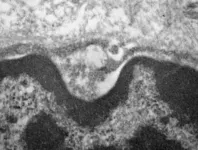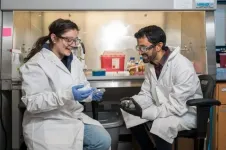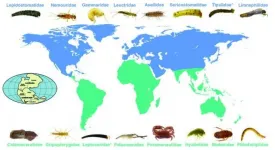(Press-News.org) BOSTON - Significant amounts of atherosclerotic plaque have been found in the coronary arteries of people with HIV, even in those considered by traditional measures to be at low-to-moderate risk of future heart disease, according to a study published in JAMA Network Open.
This finding emerged from the global REPRIEVE (Randomized Trial to Prevent Vascular Events in HIV) study, in which Massachusetts General Hospital (MGH) is playing a key coordinating role. Researchers found that the higher-than-expected levels of plaque could not be attributed simply to traditional cardiovascular disease risk factors like smoking, hypertension, and lipids in the blood, but were independently related to increased arterial inflammation and immune system activation.
"While we know that people living with HIV who are receiving antiretroviral therapy are at increased risk of coronary artery disease, our understanding of the mechanisms behind this phenomenon have been very limited," says Steven Grinspoon, MD, chief of the MGH Metabolism Unit and co-principal investigator of REPRIEVE. "The latest findings from REPRIEVE expand our knowledge and provide important insights that set the stage for further studies to identify effective plaque reduction or prevention strategies, such as the possible use of statin medicines."
REPRIEVE is the largest study of cardiovascular disease among people living with HIV, having enrolled 7,700 participants at more than 100 sites in 12 countries around the world, in collaboration with the AIDS Clinical Trials Group (ACTG). The newly published results are from a subset of the overall trial, consisting of 755 individuals between the ages of 40 and 75 enrolled in 31 sites across the United States. This is the largest study to assess plaque levels in the arteries of people with HIV who have no known heart disease and are eligible for primary cardiovascular prevention. The study used coronary CT angiography to assess plaque and then correlate results with blood samples that measured inflammation and immune activation.
The MGH-led study found that 49 percent of participants had plaque in their coronary arteries. While significant narrowing of the arteries was rare, nearly a quarter had plaque which the researchers considered "vulnerable," that is, at risk for potential future cardiovascular problems. "The prevalence of plaque found in people with HIV was striking, though the number of lesions was limited in most people and only a portion could be explained by traditional risk factors," says co-author Michael Lu, MD, MPH, co-director of the MGH Cardiovascular Imaging Research Center. "We learned that the plaque burden was also associated with higher levels of arterial inflammation and immune system activation independent of traditional risk scores."
Enabling researchers to assess these nontraditional cardiovascular risk factors were two biomarkers which they hypothesized could reflect premature cardiovascular disease among people with HIV. They are interleukin 6 (IL-6), associated with immune system activation, and LpPLA2, associated with arterial inflammation. "It was particularly notable to observe the increased levels of IL-6 in relationship to plaque among relatively healthy people with HIV, inasmuch as immune system activation may have damaging effects on the vessels of the heart over time," notes Grinspoon.
In addition to helping researchers better understand the mechanisms of cardiovascular risk in people with HIV, the two biomarkers will be evaluated in the next phase of REPRIEVE for their ability to predict major events, such as heart attacks and strokes. That ongoing research will also investigate the potential of statin therapy to reduce lipid levels - its primary therapeutic target -- as well as plaque and markers of inflammation.
"We know that cardiovascular disease is occurring among people with HIV at approximately twice the rate of people without the disease," says Grinspoon, "which is why REPRIEVE is so critical in terms of discovering new ways to mitigate those risks so that people with HIV can be assured healthy and full lives."
INFORMATION:
Grinspoon is a professor of Medicine at Harvard Medical School (HMS). Lu is an assistant professor of Radiology at HMS. REPRIEVE trial leadership team also includes Pamela Douglas, MD, professor of Medicine at Duke University, and Heather Ribaudo, PhD, principal research scientist at the Harvard T.H. Chan School of Public Health. Other MGH investigators include Udo Hoffmann, MD, Borek Foldyna, MD, Markella Zanni, MD, Kathleen Fitch, MSN, Emma Kileel, MPH, Julia Karady, MD, Jana Taron, MD, Thomas Mayrhofer, PhD, Evelynne Fulda, BA, and Kayla Paradis, BS. REPRIEVE is funded through grants from the National Institutes of Health, with additional funding from Gilead Sciences, Inc., Kowa Pharmaceuticals American, Inc., and ViiV Healthcare Ltd.
About the Massachusetts General Hospital
Massachusetts General Hospital, founded in 1811, is the original and largest teaching hospital of Harvard Medical School. The Mass General Research Institute conducts the largest hospital-based research program in the nation, with annual research operations of more than $1 billion and comprises more than 9,500 researchers working across more than 30 institutes, centers and departments. In August 2020, Mass General was named #6 in the U.S. News & World Report list of "America's Best Hospitals."
The expected decline in the number of landfills across the United States coupled with bans on disposing large amounts of organic waste in landfills that have been enacted in multiple states has prompted researchers at the U.S. Department of Energy's (DOE's) National Renewable Energy Laboratory (NREL) to examine other ways to grapple with the issue of food waste disposal.
The researchers determined no single solution exists in the United States for dealing with food waste disposal. NREL researchers Alex Badgett and Anelia Milbrandt came to that conclusion after examining the economics involved in five different ways to ...
In Brazil, researchers at the University of São Paulo’s Medical School (FM-USP) have discovered that SARS-CoV-2 infects and replicates in the salivary glands.
Analysis of samples from three types of salivary gland obtained during a minimally invasive autopsy procedure performed on patients who died from complications of COVID-19 at Hospital das Clínicas, FM-USP’s hospital complex, showed that tissues specializing in producing and secreting saliva serve as reservoirs for the novel coronavirus.
The study was supported by FAPESP and reported in an article published in the Journal of Pathology.
The researchers said the discovery ...
Bioenergy crops are an alternative energy source that, unlike fossil fuels, could positively impact the environment by reducing greenhouse gases, soil erosion, and carbon dioxide levels. They can be produced even more sustainably if they are grown on poor quality land unsuitable for food. To make up for the poor land quality, these crops can rely on soil microbes like bacteria and fungi to help them access nutrients and water and store more carbon.
Switchgrass, a native prairie species, is championed as a promising bioenergy crop due to its ability to grow across many climates. ...
BUFFALO, N.Y. - How the media frame stories about science affects the public's perception about scientific accuracy and reliability, and one particular type of narrative can help ameliorate the harm to science's reputation sometimes caused by different journalistic approaches to scientific storytelling, according to a new study led by a University at Buffalo researcher.
"What our experiment shows is that the way the news media talk about science focuses too much attention on individuals in a way that doesn't accurately describe the way science actually works," says ...
Amid calls for racial and social justice nationwide, businesses and educational institutions are grappling with how to adopt more inclusive organizational practices, including more diversified hiring. However, recruitment teams and strategic leaders often blame their lack of a diverse workforce on a lack of diverse applicants. A large study of recruitment data suggests a simple and efficient way of increasing diversity in applicant pools: have more diverse recruitment committees and leadership teams.
The study, led by researchers at the University of Houston's Center for ADVANCING ...
Findings from a study published today [6 July] in the Journal of the American Medical Association (JAMA) have prompted new World Health Organization (WHO) recommendations to use interleukin-6 antagonists in patients with severe or critical COVID-19 along with corticosteroids.
A new analysis of 27 randomised trials involving nearly 11,000 patients found that treating hospitalised COVID-19 patients with drugs that block the effects of interleukin-6 (the interleukin-6 antagonists tocilizumab and sarilumab) reduces the risk of death and the need for mechanical ventilation.
The study, which was coordinated by WHO in partnership with King's College London, University of Bristol, University ...
ITHACA, N.Y. - As offices nationwide spring back to life, interior space designers and architects will soon have an easy-to-use planning tool to place indoor workplace furniture, staff, partitions and ventilation in a manner that maximizes fresh air flow and reduces the risk of airborne pathogens.
The Cornell Environmental Systems Lab in the College of Architecture, Art and Planning will introduce a new indoor module for their existing Eddy3D software, a professional-level airflow and microclimate simulator that can help improve ventilation.
The new indoor module will be released this summer, while the research supporting it will ...
Scientists and engineers are constantly looking for ways to better our world.
Synthetic biology is an emerging field with promise for improving our ability to manufacture chemicals, develop therapeutic medicines such as biopharmaceuticals and vaccines, and enhance agricultural production, among other things. It relies on taking natural or engineered pieces of DNA and combining them in new ways in biological systems, such as microbes, bacteria or other organisms.
According to University of Delaware's Aditya Kunjapur, assistant professor of chemical and biomolecular engineering, as these sophisticated microbial technologies are advanced, scientists need to explore ways to keep these organisms from ending up in the wrong environment.
For example, a bacterium that is good at making ...
UNIVERSITY PARK, Pa. -- What if the COVID-19 virus could be used against itself? Researchers at Penn State have designed a proof-of-concept therapeutic that may be able to do just that. The team designed a synthetic defective SARS-CoV-2 virus that is innocuous but interferes with the real virus's growth, potentially causing the extinction of both the disease-causing virus and the synthetic virus.
"In our experiments, we show that the wild-type [disease-causing] SARS-CoV-2 virus actually enables the replication and spread of our synthetic virus, thereby effectively promoting its own decline," said Marco Archetti, associate professor of biology, Penn State. "A version of this synthetic construct could be used as a self-promoting ...
UNIVERSITY PARK, Pa. -- The fast-moving decline and extinction of many species of detritivores -- organisms that break down and remove dead plant and animal matter -- may have dire consequences, an international team of scientists suggests in a new study.
The researchers observed a close relationship between detritivore diversity and plant litter decomposition in streams, noting that decomposition was highest in waters with the most species of detritivores -- including aquatic insects such as stoneflies, caddisflies, mayflies and craneflies, and crustaceans such as scuds and freshwater shrimp and crabs.
Decomposition ...



